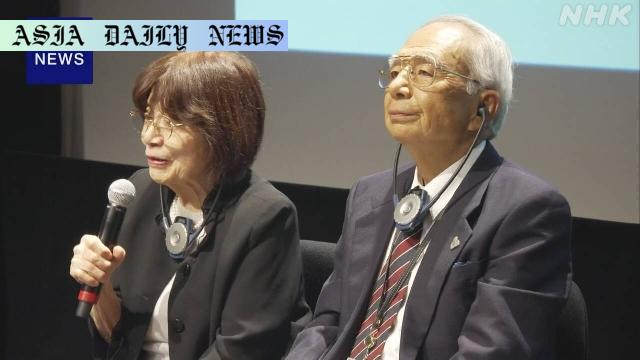Nuclear Weapons: Japanese atomic bomb survivors and activists urge France to abolish nuclear arms, sharing personal agonizing memories.
- Japanese survivors of Hiroshima emphasize the devastation of nuclear weapons.
- The survivors advocate for peace and the abolition of nuclear arms in France.
- France has been urged to explore solutions without nuclear deterrence.

Introduction: The Legacy of Atomic Bomb Survivors
The harrowing experiences of the Hiroshima atomic bomb survivors resonate strongly even after nearly eight decades. Recently, 87-year-old Yahata Teruko and 82-year-old Iida Kunihiko, survivors of the 1945 Hiroshima atomic bombing, delivered heartfelt speeches in Paris. Their words carried a poignant message of peace while condemning the threat posed by nuclear arms. Speaking as representatives of a generation that witnessed unimaginable devastation, these survivors called for an end to nuclear weapons, expressing their deep anguish and perseverance despite the ongoing physical and emotional toll.
The Inescapable Tragedy of Hiroshima
Yahata Teruko, only eight years old at the time of the bombing, recalled the haunting imagery of suffering on that fateful day. She described witnessing people walking with burned and peeled skin as ‘a procession of silent ghosts.’ Such heart-wrenching memories make her story more than just a historical account—it is a solemn reminder of the horrors humanity is capable of perpetuating. She shared a belief that reflecting on such dark moments of history can help society move forward. Yahata also emphasized that a single nuclear bomb could obliterate human existence—a dire warning in an era of rising nuclear tensions.
The Cost of Survival
Iida Kunihiko shared his equally painful journey, recounting the loss of his mother and sister to the same explosion and his continued struggles with the effects of radiation exposure. Suffering from multiple tumors, Iida’s resilience is a powerful testament to the long-term human and environmental consequences of nuclear arms. His story, combined with Yahata’s, underscores the catastrophic humanitarian impact of nuclear weapons and the need for their eradication.
A Youth Movement for Remembrance
The event also featured young Japanese activists determined to keep the memories and lessons of atomic bomb survivors alive. These youth speakers serve as an important bridge, ensuring that the traumatic legacy of Hiroshima is not forgotten by future generations. Their involvement adds hope to an otherwise solemn message, suggesting that the fight for peace transcends age and borders, inspiring individuals globally to advocate for nuclear disarmament.
Global Perspectives: France’s Role
France’s position as one of the world’s nuclear powers makes its stance on nuclear deterrence significant. Despite support for deterrence within the country, activists like Yahata urge France to find a different, peaceful approach to maintaining global security. Their plea is not only a call for empathy but an invitation for governments to explore nonviolent alternatives. A French woman who attended the event expressed her approval, stating that discourse in favor of peace is especially valuable in today’s tense international climate.
Conclusion: A Collective Responsibility
Yahata resonates with a profound sense of responsibility as a witness of Hiroshima’s devastation. Her message to advocate for peace resonates on a global scale, calling for humanity to rise above violent conflicts. By sharing these testimonies, Hiroshima’s survivors underscore the necessity for global unity against nuclear proliferation. Their appeal is not simply about memory—it is a rallying cry to ensure tragedies like Hiroshima never occur again.



Commentary
The Emotional Weight of Hiroshima’s Legacy
The stories shared by Yahata Teruko and Iida Kunihiko are both deeply moving and heavy with emotion. Their experiences as survivors of the Hiroshima atomic bombing offer a firsthand perspective on the catastrophic destruction that nuclear weapons can bring. These accounts are stark reminders that the human cost of nuclear warfare extends far beyond the immediate effects, with survivors carrying the burden of loss, physical ailments, and psychological scars over decades.
A Global Call for Change
Their message is especially relevant in today’s increasingly polarized world, where the threat of nuclear conflict looms larger than ever. Beyond their personal stories lies an impassioned plea for leaders, especially in nuclear-armed nations like France, to rethink strategies that rely on the destructive power of these weapons. Yahata’s thoughtful articulation of her belief in moving forward while reflecting on the past is both inspiring and strikingly relevant in today’s geopolitical context.
The Youth’s Role in Ensuring Peace
Furthermore, the efforts of young Japanese activists to keep these stories alive stand out as a key aspect of this dialogue. As the survivors of Hiroshima age, it becomes increasingly crucial for the next generation to understand their struggles and carry forward the advocacy for peace. This intergenerational collaboration ensures that the lessons learned from tragic events like Hiroshima remain relevant and resonate with people of all ages and backgrounds.
Reflecting on Humanity’s Future
Ultimately, the Hiroshima survivors’ appeal for nuclear disarmament highlights a simple yet profound truth: the future of humanity depends on our collective ability to embrace peaceful resolutions. Their bravery in sharing their stories should serve as motivation for governments, organizations, and individuals to work together toward a world free of nuclear threats. The time to act is now—it is a chance to protect not just this generation but those that follow.